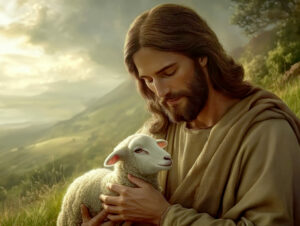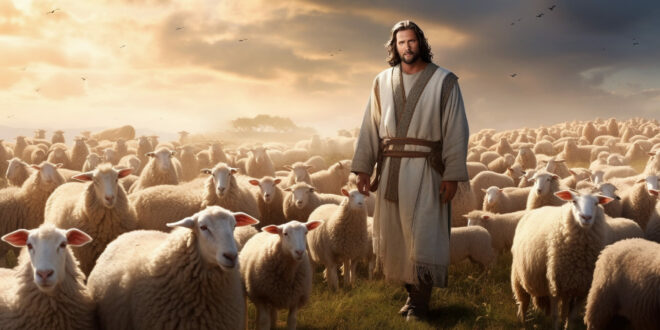The shepherd is not a despised social outcast as some traditions portray him. Shepherding is one of the most ancient professions. Even today, almost a quarter of the earth’s surface is used for raising livestock. A writer for The Brussels Times estimates there are about 200 million (yes million) shepherds worldwide, both professional and amateur.
Indeed, the Bible does not portray shepherds as outcasts. Consider Abraham, Isaac, Jacob, Joseph, and David – all shepherds. God describes himself as the Shepherd in Genesis 49:24, Psalm 80:1, and the 23rd Psalm. In John 10:11, Jesus says, “I am the good shepherd.”
The shepherd would commence his day dressed in a tunic held together by a girdle (belt) and an outer garment for warmth, called an aba. He would carry a scrip, a small bag of dried skin. It would contain his daily food: some bread, cheese, dried fruit, and maybe some olives.
To protect the sheep, he would carry a rod, similar to a policeman’s club, for defense and protection. Also, as part of his equipment, he would have a staff. The staff might be similar to a modern-day cane. It was about five or six feet in length, sometimes with a crook on the end. The shepherd would use it for walking, handling the sheep, and protection.
Part of his weaponry would be a sling made of two strips or strings of sinew, leather, or rope attached to a small leather bag to hold a stone. He would swing the sling once or twice around his head and then discharge the stone by letting go of one of the strings. The shepherd would use the sling to protect against robbers or predators and direct the flock. He could hurl the stone in front or back of a sheep to get its attention and turn it in the right direction.
In addition to protecting the flock, the shepherd finds and provides them with food and water. In the spring, green grass is abundant. In the hot months, there is standing hay in the fields. When grass becomes scarce in the winter and hay is unavailable, the shepherd must provide by cutting down branches with leaves for food. He may even lead them to a different location where he knows there is grass.
The shepherd must provide water, so he should always know where to find it for his flock. He would search for the location of running water or, better yet, fresh pools of water. When that is unavailable, he must know where the wells are and draw water out of the well sufficient for the sheep.
One of the shepherd’s more important functions is knowing his sheep. A shepherd was asked how he knew if all his sheep were present. He replied, “Master, if you were to put a cloth over my eyes, and bring me any sheep and only let me put hands on its face, I could tell in a moment if it was mine or not.”
The 23rd Psalm reveals the provision by God the Shepherd. He makes the sheep lie down in green pastures and leadeth them beside the still waters.
In John 10 Jesus presents himself as the Good Shepherd. Read as Jesus tells you about his character, qualifications, and abilities as the Good Shepherd.
- He has access to the sheepfold. He is not a thief or robber. (10:1).
- He calls his sheep by name. He knows them. (10:3)
- He leads and goes before them. He is the leader. (10;3-4)
- The sheep follow him because they know his voice. (10:4-5). “When it becomes necessary to separate several flocks of sheep, one Shepherd after another will stand up and call out: “Tahhoo! Tahhoo” or a similar call of his own choosing. The sheep lift up their heads, and after a general scramble, begin following each one his own shepherd. They are thoroughly familiar with their own Shepherd’s tone of voice. Strangers have often used the same call, but their attempts to get the sheep to follow them always fail.” (From Bible-History.com)
- He comes to give abundant life. (10:10)
- He gave His life for the sheep. (10:11, 15)
- He knows his sheep, and they know him. (10:14)
- He has other sheep also (Jew or Gentile). (10:16)
- He has power to lay down his life and to raise it again from the dead. (10:18)
- His sheep hear his voice, and they follow Him. (10:27).
- He gives eternal life to His sheep, and they will never perish. (10:28-29).
Jesus is the Good Shepherd who gave His life for you.

Do you know the Good Shepherd as your personal Savior? If not, turn to Him today as your Savior from sin and experience the new life He has to give you.
If you do know the Good Shepherd as your Savior, are you listening to His voice and following Him?
 The Bottom Line, Ministries Christian News, Articles, & Poetry
The Bottom Line, Ministries Christian News, Articles, & Poetry 




